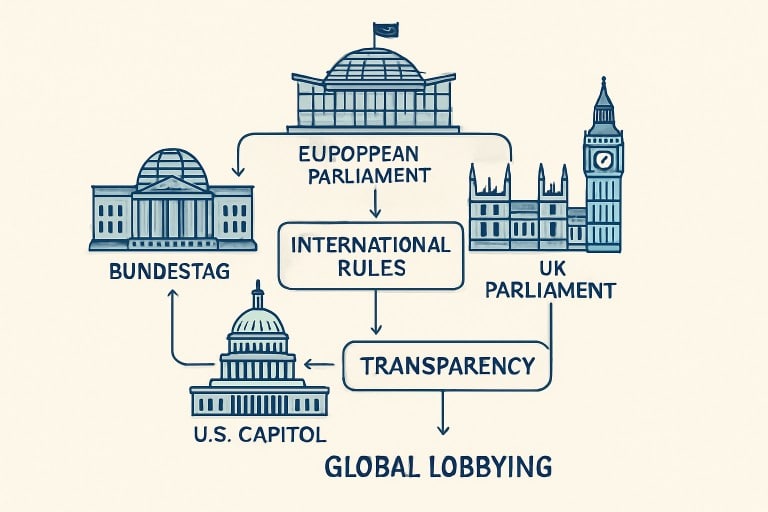Key Takeaways
- Global regulatory changes are reshaping international lobbying practices.
- Enhanced transparency and accountability measures are being implemented.
- Organizations must adapt to new compliance requirements to maintain effective advocacy.
Introduction to International Lobbying
International lobbying faces profound transformations as governments worldwide implement new laws to enhance transparency, accountability, and ethical practices. Organizations, corporations, and advocacy groups must now be more vigilant in navigating compliance and achieving ethical engagement amid heightened scrutiny. Understanding and adapting to evolving lobbying compliance requirements is crucial for maintaining credibility and influence.
Across several major jurisdictions, stricter disclosure mandates and oversight measures are changing how organizations interact with policymakers. These rising standards have wide-reaching implications, forcing lobbyists to rethink their approaches while responding to growing public demands for openness in political advocacy. As each country rolls out its own approach, compliance becomes more intricate and essential.
Germany’s Lobbying Reforms
In a significant move toward curbing opaque influence, Germany enacted a mandatory lobbying register in January 2022. This new system compels interest representatives, including public affairs professionals, consultants, associations, and NGOs, to publicly disclose their lobbying-related activities and contacts with federal lawmakers. The register is seen as a pivotal step for increasing transparency and reinforcing public trust in Germany’s democratic processes.
Despite this progress, advocacy groups and transparency watchdogs continue to voice concerns that the reforms fall short in certain areas. For example, there are ongoing debates about whether the measures adequately address potential conflicts of interest or if a more robust code of conduct should be imposed on lobbyists. Expanding the rules to cover interactions with the executive branch and local policymakers remains a topic of discussion among German lawmakers and civil society.

European Union’s Transparency Initiatives
The European Union’s focus on transparency has intensified, especially following revelations about the scale of lobbying at the EU level. The European Parliament’s binding rules, introduced in January 2019, require Members of the European Parliament (MEPs) who are involved in drafting and negotiating legislation to publish their meetings with lobbyists on a public platform. This measure is designed to bring greater clarity to the legislative process and to address increasing citizen concerns over the influence of special interest groups.
Transparency International and other prominent NGOs have welcomed these actions but continue to advocate for broader enforcement and the extension of transparency obligations across all EU institutions, including the European Council and the Commission.
United Kingdom’s Foreign Influence Registration Scheme
Responding to rising concerns regarding covert foreign influence, the United Kingdom government unveiled the Foreign Influence Registration Scheme (FIRS) through the National Security Act 2023. This new regime requires all individuals and organizations that conduct political influence activities, at the direction or request of a foreign power, to formally register those arrangements. Detailed guidance on the scheme is provided by the UK government in their Foreign Influence Registration Scheme factsheet.
FIRS applies across a wide spectrum of engagements, from consulting and public relations work to general advocacy tied to foreign governments. The registration system is intended to ensure that UK policymakers and the public are fully aware of overseas interests participating in domestic politics. Authorities expect the new law to reinforce the integrity of Britain’s democratic institutions and provide a deterrent against foreign interference.
United States’ Focus on Foreign Lobbying
The United States has renewed its focus on foreign lobbying, seeking to strengthen oversight and close loopholes through the Foreign Agents Registration Act (FARA). This law, first enacted in 1938, requires anyone representing a foreign principal—be it governments, corporations, or political parties—to publicly file detailed disclosures of their activities and relationships. In recent years, the Department of Justice has intensified its enforcement, resulting in a sharp uptick in investigations and compliance initiatives.
Current legislative proposals aim to modernize FARA further, clarifying registration thresholds and strengthening penalties for non-compliance. Analysts at Reuters report that bipartisan support is growing for enhancing the law’s reach, particularly in the context of mitigating foreign influence in U.S. elections and policymaking. Organizations must stay alert to these new developments, recognizing that the legal and reputational consequences for missteps are greater than ever before.
Impact on Organizations and Lobbyists
For any entity engaged in transnational advocacy, evolving rules underscore the strategic importance of rigorous compliance frameworks. New transparency and disclosure mandates mean organizations must not only track communications and relationships more closely but also update internal policies, train staff, and establish monitoring mechanisms to avoid violations.
Additionally, public expectations about lobbying ethics are intensifying, driven by greater media scrutiny and a growing appetite for government accountability. Compliance is no longer just a legal obligation—it has become a core reputational concern. Lobbyists and organizations must remain informed and flexible, learning to anticipate regulatory shifts and respond with agility in an increasingly complex global landscape.
Conclusion
The ecosystem of international lobbying is changing rapidly, with governments introducing stricter rules to ensure more transparent and accountable advocacy. These developments highlight the critical importance of staying abreast of regulatory updates and implementing robust internal processes to achieve successful and ethical lobbying outcomes. By embracing these changes proactively, organizations can not only safeguard their legal standing but also build lasting trust with stakeholders and the public.

